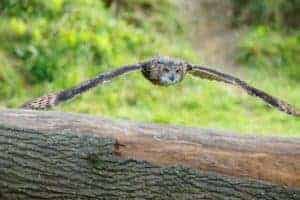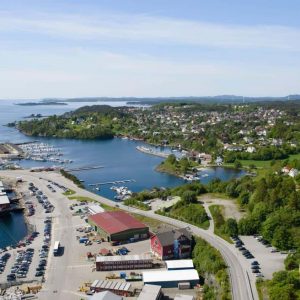The Norwegian Environmental Protection Association sees that there is a lot of awkwardness and evasive attitudes to offshore wind from some other organisations. The last out is the Nature Conservation Association in a longer chronicle on NRK.no.
https://www.nrk.no/ytring/steile-fronter-til-havs-1.15385823
Here they start by being concerned about the state of the sea and in our fjords, and that climate change is worsening the situation further. Then they urge caution, and mention territorial conflicts with marine ecosystems, fisheries and other interests. But then the real desire comes into view;
“We urge caution. Both the government and the industry must learn from the mistakes that have been made on land. If good rules of the game are made now, we will save both society and nature from many problems later."
Here, it is clearly just a matter of sticking with some good impact assessments and good rules of the game, then surely offshore wind is really that good, according to the Nature Conservancy's leader, Silje Ask Lundberg.
Then comes some new concerns;
"It goes without saying that building large concrete foundations in a fish spawning area or on a coral reef must be prohibited because of the great risks this entails for marine life."
“Good mapping is required to ensure that this does not happen. The noise from the construction can also disturb marine mammals.”
But these worries were certainly not so dangerous after all, because here it can still be a new Garden of Eden where everything returns and becomes just as pleasant and rosy;
"At the same time, research shows that the foundations of offshore wind can function as artificial reefs, and a number of studies find no difference in fish and eel populations before and after development."
"Marine mammals also mostly return after development, and the sound from the constructions is far weaker than with 3D seismic that is used in connection with oil exploration."
Well, then there will be a small admonition again, before they again state that, yes, offshore wind development, we will get that as surely as a new Monday comes after a weekend;
"All development of energy has consequences for nature, including offshore wind. The authorities are therefore faced with a large and important task: to secure the rich nature of the sea in the sea window development."
The Norwegian Environmental Protection Association fundamentally disagrees with this position. We have a clear position AGAINST offshore wind.
The leader of the Norwegian Nature Conservation Association goes on to say that when you say a clear NO to offshore wind, you thereby create steep fronts;
“Therefore we cannot look at the issue of offshore wind as completely black and white, and neither nature nor the climate gets better with steep fronts and a biased conclusion."
Dear Norwegian Nature Conservancy and Silje Ask Lundberg. We at the Norwegian Environment Protection Association are deeply concerned about all the consequences of offshore wind, not just climate and biodiversity. The more we investigate the various issues surrounding offshore wind, we only become more and more worried. It is not us who create these fronts, it is our own authorities, and greedy companies and multinational groups who are responsible. We stand up for natural diversity, vulnerable species and ecosystems.
If anyone hasn't caught on, the sea and our coastal areas are actually one of our biggest and most important food dishes. We have a duty to take care of it for the world's growing population, and we have a duty to take care of it for our descendants. And we definitely don't do that by deploying giant hormone propellers and bird grinders so that they cut up seabirds and fertilizes the sea with microplastics, epoxy compounds and Bisphenols. Nor do we do it by filling the living environments in the sea with broad-spectrum and low-frequency noise.
When the Nature Conservancy takes a position where they see the foundations of offshore wind as a new Garden of Eden "artificial fishing reef" and marine mammals"which mostly returns after development” because "the sound from the constructions is far weaker than with 3D seismic", then we wonder how you can take such a position. There is a great deal to suggest that too many species are completely different, and such claims are often based on very limited knowledge acquisition or ignorance. And where did the "precautionary principle" become, which says that we must know before we take action that could have potentially negative consequences that we are not aware of today? If we do not know or have sufficient knowledge, then we have to find something else and more sensible to do. Because we cannot gamble with the fragile life in the sea just because we believe our own abilities surpass the mechanisms nature has spent millions of years developing and perfecting. It only takes half an hour to destroy a coral reef that nature has spent tens of thousands of years creating. It only takes a brief one-second wrong decision to destroy an important spawning area. We ourselves think we can tame most of the forces of nature, but are we really that much smarter than nature? When we really think about it? We probably have a NEW PLANET to move to when the ONE we're on now is used up...
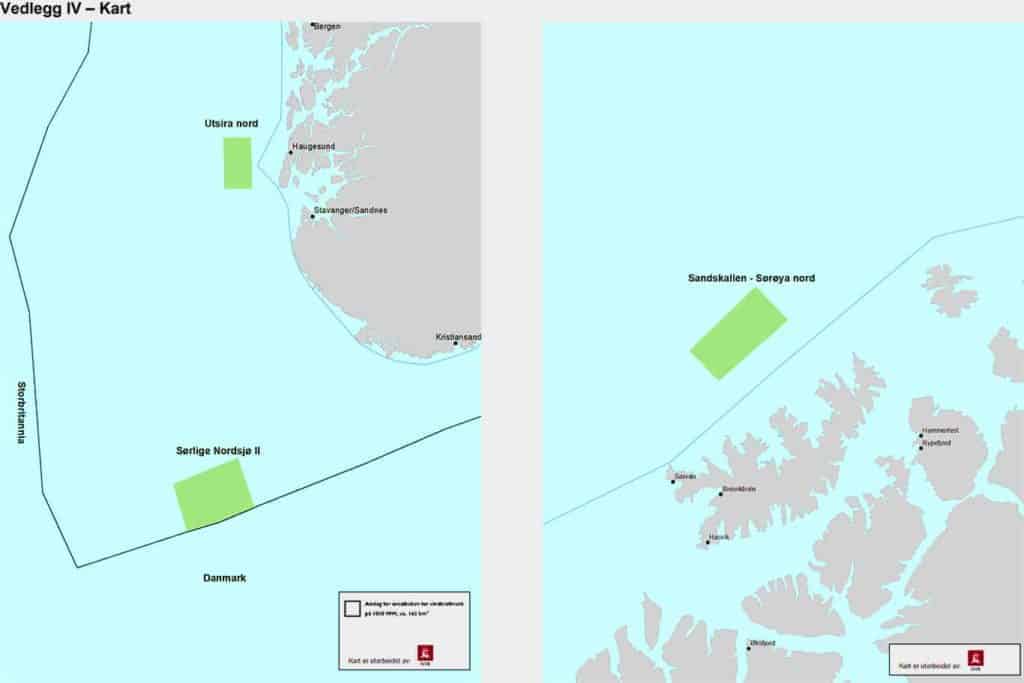
Actually, we should be surprised by such an awkward attitude to the consequences of sea wind, but we really aren't. After all, the management of the Norwegian Nature Conservation Association has accepted offshore wind for a long time, for example in their consultation input on 19 October 2019 to "Proposal on the opening of areas for renewable energy at sea and proposal for the Ocean Energy Act". Here there were three areas to be investigated, Sandskallen Nord, off Sørøya in Finnmark, Utsira Nord, off the bird island Utsira in Rogaland, and Sørlige North Sea II, in the far south on the Norwegian continental shelf.
It is urgent to cut greenhouse gas emissions, and electrification is the main move to phase out fossil energy use. Offshore wind can contribute and the Nature Conservation Association is initially positive. New renewable energy must replace today's fossil energy use and Norway's most important climate contribution is to stop further exploration for oil and gas and phase out the petroleum sector. There are also important natural values in the sea, and these must be taken into account when wind power plants are approved, located and built out. It is necessary to learn from the conflicts that have arisen on land, and tighten the requirements for impact assessments and emphasis on natural values.
The Norwegian Nature Conservation Association has the following overall comments:
- It could potentially be opened up for offshore wind in the three proposed areas, if natural values and nature-based industries are sufficiently taken into account in the process.
- The development of renewable energy must be prioritized rather than the petroleum industry in areas with conflicts of interest. This applies particularly in Southern North Sea II, which we believe is a potentially good area for offshore wind.
"This is particularly true in Southern North Sea II, which we believe is a potentially good area for offshore wind"? Then all that remains is to thank the outgoing leadership of the Norwegian Nature Conservancy for their very unclear vacillating position on offshore wind, and for supporting the government's desire to destroy one of the important spawning areas for e.g. sandpipers. Admittedly, they say further down in the consultation statement that they want the parts of the field where the toads spawn to be taken out, but how naive is it really possible to be? If you give NVE/OED, Fred Olsen, Røkke, a pension fund in the Cayman Islands or the rest of the financial elite the little finger, then you know that they take solid account of a solitary sea urchin, or a small insignificant spawning ground. Do we then think that you have the right priorities in place?
On the one hand, they are worried about the natural diversity in the sea, and on the other, they are not developing enough "renewable" power fast enough. It is not possible to ride two horses that want to go in different directions at the same time. Offshore wind as an energy solution is a bad climate project that often ends up burdening the climate instead of saving it. In terms of energy policy and social policy, it does not provide any positive benefit either, as it requires large material and financial investments paid for by the community and we get an expensive, unstable power back.
Some special workplaces and "technology exports" we can probably look forward to. We have to buy the turbines and towers themselves from abroad anyway, and when it comes to construction, operation and maintenance, it is often foreign companies from low-cost countries that run away with that part as well. So if your name is not Fred Olsen or Kjell Inge Røkke, there is hardly anything special to gain from the destruction of nature. The consequences for fish and fisheries, birds, marine organisms and mammals, and for our own food dishes are disturbing and dramatic.

Sea wind, what's going on?
As a result of wavering opinions and woolly input from our friends, two of the three selected areas, Utsira Nord and Sørlige Nordsjø II opened for applications for license processing by OED on 12 June 2020, and the license processing for these areas opened from 1 January 2021.
Here, there will be new battles for our common creatures, ecosystems, and for our common dinner plate.
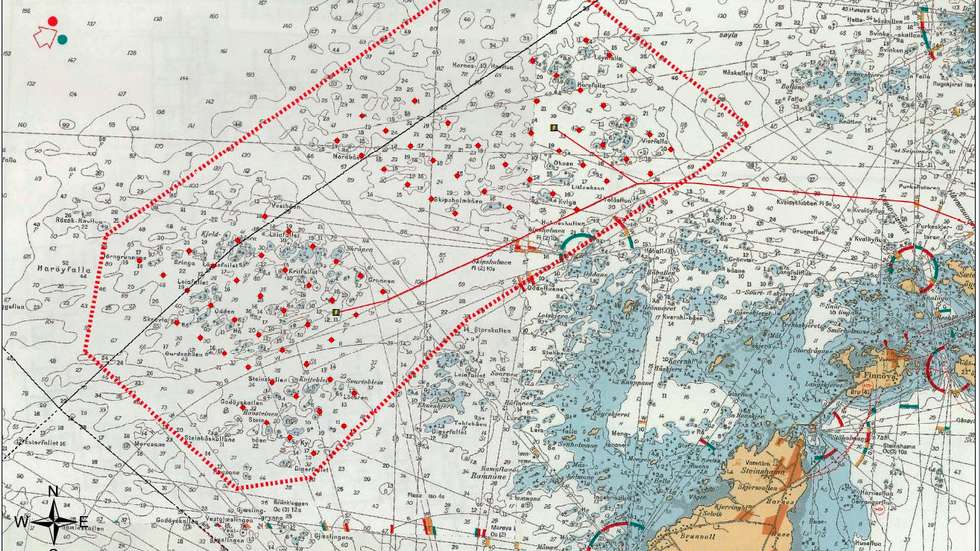
We recently received the happy news about OED's rejection of the postponed deadline for Havsul-I.
Right in the rocks outside Haramsøya, and just north of the famous bird mountain Runde on Mørekysten, in the middle of the spawning grounds for NVG herring, coastal cod and other important species, the intention was to build a wind power plant. The impact assessments were hopelessly old, flawed and out of date, and it has been all the way since 2006 before they found out that they began to have little time in relation to the given deadlines, so they once again applied for a new postponement.
The Swedish Environmental Protection Association (NMF) submitted a consultation statement in relation to the latest application for postponement on 16 September 2019. Read more about the case and our consultation report for Havsul-I here. NVE took advantage of the worst of the corona fog and went ahead with approving the application and giving Havsul-I an extended deadline for commissioning. NMF complained on 8 May 2020, together with several other organisations, about this hopeless and anti-nature decision to the OED. Download our complaint here (PDF).
The Ministry of Petroleum and Energy finally rejected applications for a postponed deadline for three wind power plants on 26 March 2021, Havsul I, Remmafjellet wind power plant, and Kvinesheia wind power plant.
https://www.regjeringen.no/no/aktuelt/ddf/id2841831/
The Norwegian Environmental Protection Association has a clear position AGAINST offshore wind, and in addition also against all other wind power.
For more than 20 years, the Norwegian Environmental Protection Association (NMF) has worked actively against wind power in Norway. The arguments we had in 1999 are actually just as relevant today, and in addition we have also gained a lot of new knowledge. The more we know about wind power, the more we see the value of stopping further developments. It is not good for either species diversity, landscape, public health, social economy or electricity supply. Nor is it a good climate project either, where they devour the earth's resources in order to build and submerge huge areas of vegetation and carbon-storing bogs. The vast majority of the climate costs of mining, production, shipping, construction work, release of stored greenhouse gases etc. come long before they get to produce their first kilowatt, which is not particularly "green" either. At best, it takes years to pay off the climate investments in emissions before they can pay off the climate debt. The same also applies to offshore wind, but unlike wind power on land, everything is so much bigger; turbines, infrastructure, costs, subsidies and environmental consequences.
It seems that a lot of people think that if we just throw the damned wind power at sea, then everything will be that much better? This is the old way of thinking. After all, we live in 2021 and should know better. You don't clean your home by sweeping all the rubbish under the carpet, and you no longer throw your rubbish into the sea. One respects the sea and the value it represents for our fellow creatures and for ourselves as something our own survival as humans depends on every single day 100%. You don't gamble with our sea areas in 2021...
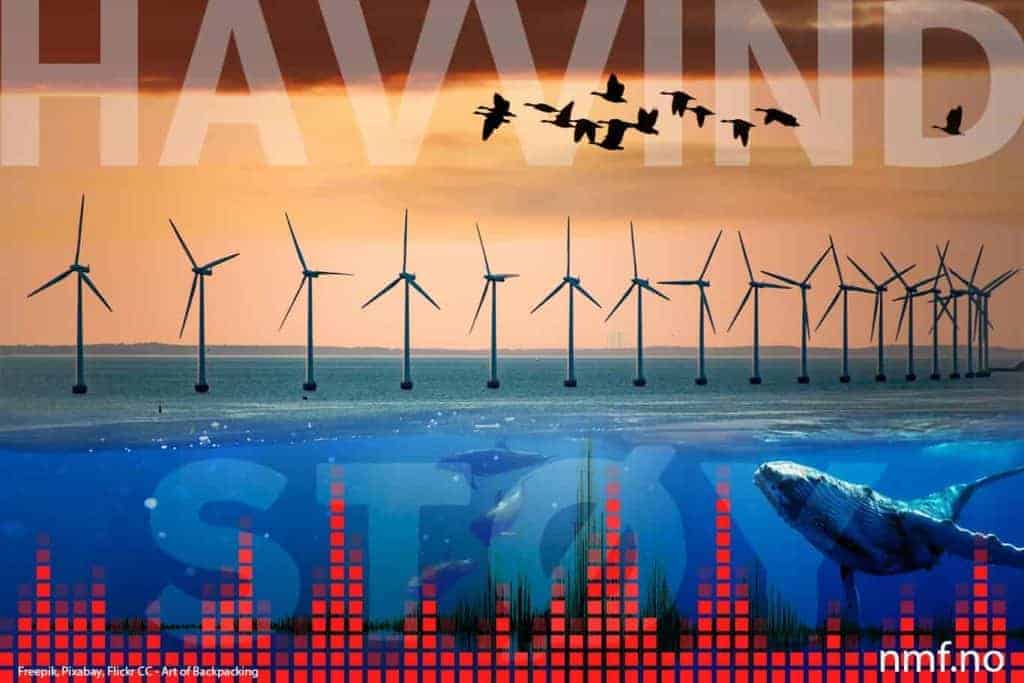
Read more about the Swedish Environmental Protection Agency's work with offshore wind and similar matters here...
- The Swedish Environmental Protection Agency's consultation response on offshore wind (article and PDF)
- The Swedish Environmental Protection Agency's consultation response on offshore wind (PDF)
- Block environmentally damaging electrification of the Norwegian continental shelf and offshore wind - Upgrade and make turbines more efficient to reduce CO2 (article)
- ENOVA runs the waste line (article)
- The Swedish Environmental Protection Agency's input on the management of marine areas (article)
- "Longship" [Wasa] weak on the climate account - collides with the mercury bomb U-864 off Fedje (article)
- The Swedish Environmental Protection Agency sent a response to the consultation on the environmental pollutant Bisphenol A to the EU's chemical register ECHA/REACH (article and PDF)
- Havsul I – Hearing statement (article and PDF)
- Havsul I – NMF's Complaint against NVE's decision (PDF)
A little insight into what's to come...
We would like to clarify that we have a good relationship with the Norwegian Nature Conservation Association locally around the whole country, who we meet as very upbeat and sincere conservationists with their hearts in the right place. To us, it may seem that outgoing management in the relationship with offshore wind has been somewhat out of step with the grassroots.
In this article, we have considered the outgoing leadership of the Nature Conservation Association's lack of a clear policy against offshore wind, but they are far from the worst. While they waver and apparently do not quite know which direction to take, there are other organizations that have sailed under a faded "environmental flag" for a number of years while actively working to develop as much offshore wind as possible, and so as fast as possible. And the rosy fables about Eden's gardens of artificial fishing reefs they have been arguing for for years. There is more than one wind villain out there. Pay attention…
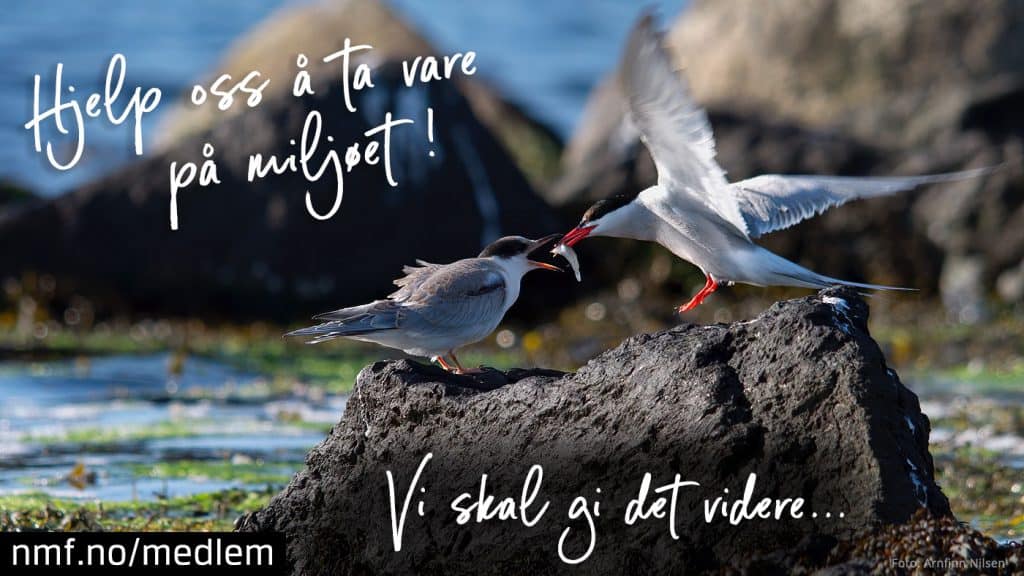

ATTENTION! New and improved registration form from Consio
Account no.: 3208.26.05966 - Whoops 96748

